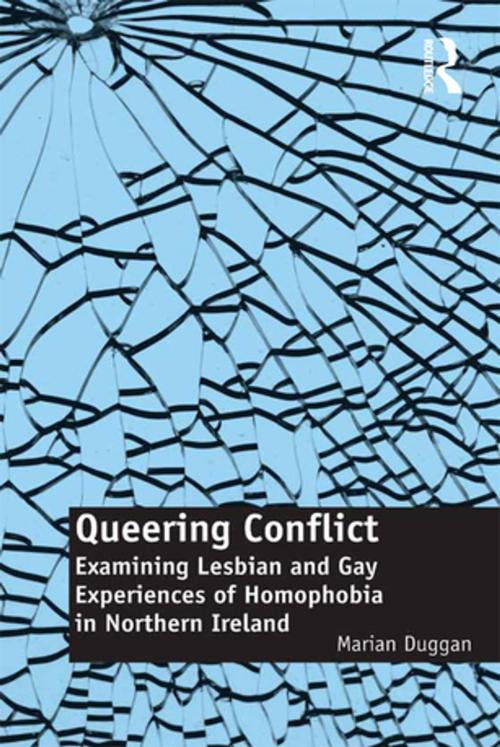Queering Conflict
Examining Lesbian and Gay Experiences of Homophobia in Northern Ireland
Nonfiction, Social & Cultural Studies, Social Science, Gender Studies, Gay Studies| Author: | Marian Duggan | ISBN: | 9781317072515 |
| Publisher: | Taylor and Francis | Publication: | May 23, 2016 |
| Imprint: | Routledge | Language: | English |
| Author: | Marian Duggan |
| ISBN: | 9781317072515 |
| Publisher: | Taylor and Francis |
| Publication: | May 23, 2016 |
| Imprint: | Routledge |
| Language: | English |
Queering Conflict offers a unique culturally specific analysis into the ways in which homophobia in Northern Ireland has been informed and sustained during the latter half of the twentieth century. This book takes the failure of the British Government to extend the 1967 Sexual Offences Act to Northern Ireland as its central point to demonstrate the subtle, but important, differences governing attitudes towards homosexuality in Northern Ireland. Both homophobia and hate crimes are shown to be situated within the framework of Northern Ireland's socio-political history as well as part of an overall culture of violence which existed as a result of 'the Troubles'. Duggan shows how the influence of moral and religious conservatism born out of sectarian divisions led to homophobia becoming an integral part of community cohesion and identity formation. Decades of political instability led to the marginalization of rights for lesbians and gay men, but the peace process has led to the development of a discourse of equality which is slowly allowing sexual minorities to situate themselves within the new Northern Ireland.
Queering Conflict offers a unique culturally specific analysis into the ways in which homophobia in Northern Ireland has been informed and sustained during the latter half of the twentieth century. This book takes the failure of the British Government to extend the 1967 Sexual Offences Act to Northern Ireland as its central point to demonstrate the subtle, but important, differences governing attitudes towards homosexuality in Northern Ireland. Both homophobia and hate crimes are shown to be situated within the framework of Northern Ireland's socio-political history as well as part of an overall culture of violence which existed as a result of 'the Troubles'. Duggan shows how the influence of moral and religious conservatism born out of sectarian divisions led to homophobia becoming an integral part of community cohesion and identity formation. Decades of political instability led to the marginalization of rights for lesbians and gay men, but the peace process has led to the development of a discourse of equality which is slowly allowing sexual minorities to situate themselves within the new Northern Ireland.















